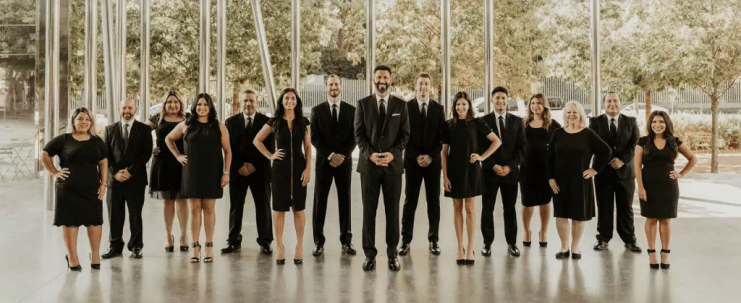Brain injuries can range from mild to severe, sometimes having lifelong impacts or tragically ending in death. These injuries often require extensive and expensive medical care, causing financial burdens. While money cannot remedy the injury, our knowledgeable Dallas brain injury lawyers at Shamieh Law can help you fight for the compensation you deserve to offset your injury’s costs.
A brain injury can be life-changing for the victim and their family financially, emotionally, and physically. The financial burden can be crippling, but through a personal injury lawsuit, you can pursue compensation to offset those costs.
Between complex Texas laws and insurance companies that attempt to pay as little as possible, the odds are stacked against you. Pursuing compensation on your own may net an unfair settlement. But with help from a Dallas brain injury lawyer, you can fight to secure the compensation you deserve.
With our in-depth understanding of Texas law and common insurance tactics, our talented team at Shamieh Law can guide you through your brain injury case. Contact us today at (469) 813-7332 for a free and confidential case review.
Why Work With Shamieh Law’s Brain Injury Attorneys in Dallas
At Shamieh Law, we believe in “Winning With Awareness.” Under this methodology, we constantly strive to become better people and lawyers in a world of empty promises. Family is a core part of our firm, and we aim to treat each client like a family member, prioritizing communication to understand unique needs and challenges.
We take pride in helping people through difficult times, from directing them toward medical attention to offering tailored legal guidance. We have years of experience with Dallas brain injury cases and have been fighting to secure compensation for victims through an unparalleled work ethic and unwavering client dedication.
Our extensive experience and in-depth knowledge of state and local laws help us navigate your case. We can determine your legal options if you or a loved one has sustained a brain injury due to another’s negligence.
We offer complete legal services, from the initial consultation to settlements or representation in court, if necessary.
Case Results
Our experienced TBI lawyers have secured millions of dollars in verdicts and settlements for brain injury victims. We’ve fought passionately for each client, taking the time to understand their unique needs and pursue the compensation they deserve. Our case results speak for themselves:
- $1.325 million for a traumatic brain injury caused by a collision involving an 18-wheeler that failed to yield
- $1 million for a broken femur, disc herniations, and a traumatic brain injury suffered in a collision caused by a drunk driver
- $700,000 for traumatic brain and spine injuries suffered when an 18-wheeler rear-ended the plaintiff’s vehicle
- $650,000 after the defendant caused a three-car collision after failing to yield to the right of way, resulting in a traumatic brain injury
- $375,000 after a stilt walker at a circus fell onto a plaintiff, resulting in a traumatic brain injury
- $350,000 from a defendant who ran a red light at high speed and flipped their vehicle, causing the plaintiff to suffer a traumatic brain injury and sustain lost wages.
- $300,000 for a client who suffered a traumatic brain injury and spinal damage requiring multiple lumbar injections when a drunk driver caused a rear-end collision
- $275,000 for spinal and traumatic brain injuries from a Lyft crash
- $250,000 after a single-car high-speed accident resulted in a traumatic brain injury, multiple fractures, and a shoulder tear.
- $225,000 after the defendant ran a red light, causing a multi-vehicle wreck resulting in a traumatic brain injury
How to Prove Liability in a Brain Injury Lawsuit
Proving negligence and determining who is liable in a brain injury lawsuit requires careful examination of the incident’s circumstances. Generally, this process requires four elements: duty of care, breach of duty, causation, and damages.
Because these cases are often complex due to various contributing factors and circumstances, an experienced head injury attorney’s help is essential. An attorney can help you navigate the legal system’s complexities while you focus on healing.
Duty of Care
The first step in the legal process involves establishing a duty of care, which is a requirement to protect the safety and well-being of others. Duty of care varies based on the circumstances surrounding the accident.
For example, suppose Tasha sustains a brain injury after another driver collides with her car even though she yielded to the right of way. Because drivers have a duty of care to operate their vehicles safely, establishing this duty here is simple. However, in cases where an injury occurs on a person’s property or in other circumstances, establishing a duty of care can be trickier because it’s often subjective.
Violation of Duty of Care
After establishing a duty of care, your lawyer must prove the at-fault party violated this duty. Perhaps the driver who collided with Tasha’s vehicle was texting while driving or recklessly speeding. In this case, the driver breached the duty to operate their vehicle safely by texting or excessively speeding.
Causation and Damages
Next, your lawyer must connect the dots to demonstrate how the other driver’s actions caused Tasha’s injuries. In Tasha’s case, her lawyer could showcase how the impact of the other driver’s vehicle violently jarred Tasha, causing a traumatic brain injury.
In the following steps, Tasha’s lawyer would compile damages to prove the amount the other driver owes her. Determining economic damages is often straightforward, as the numbers are quantifiable. However, determining non-economic damages, such as pain and suffering, can be more difficult.
Once Tasha’s lawyer determines a fair settlement amount, they would pursue it from the at-fault party.
Recovering Compensation for Brain Injuries in Texas
Brain injury victims may recover various types of compensation, including economic, non-economic, and punitive damages. The types of compensation you can pursue vary based on your case’s circumstances.
Economic
Economic damages cover the quantifiable financial costs of your injury. Many brain injuries demand extensive medical care, especially for severe brain injuries, which can quickly rack up costs.
A lawsuit can help victims recover these damages, which often include:
- Medical expenses
- Lost wages
- Loss of future earning capacity
- Travel and lodging expenses for traveling to medical centers
- Property damage, such as vehicle repairs
Non-Economic
Unlike economic damages, non-economic damages are more difficult to quantify. These damages aren’t associated with expenses related to the accident. Instead, they refer to compensation for the following:
- Pain and suffering
- Loss of consortium
- Mental, physical, and emotional distress or anguish
- Post-traumatic stress disorder
- Disability
- Disfigurement
- Lower quality of life
Non-economic damage amounts are often based on economic damages and vary depending on the injury’s severity and longevity.
Punitive
Some brain injury victims may receive punitive damages. These damages are awarded in cases with clear evidence that the victim’s injury resulted from fraud, deliberate malice, or gross negligence. They punish the negligent party for their behavior and are only awarded in rare cases.
Time Limit to File a Brain Injury Lawsuit in Dallas
Dallas brain injury victims have limited time to file a lawsuit against the negligent party. Under Texas law, most personal injury lawsuits follow a two-year statute of limitations. This means that victims only have two years to file a claim.
Failure to timely bring a claim against the at-fault party may forfeit your right to pursue compensation for the injury.
Causes of Brain Injuries
Brain injuries can stem from various accidents and incidents, including the following:
- Falls
- Motor vehicle accidents
- Domestic violence
- Sports
- Work-related injuries
- Recreational activities
Common Types of Brain Injuries
Brain injuries are often one of two types: traumatic or non-traumatic. Traumatic injuries result from external forces, typically violent blows or forces, whereas non-traumatic injuries stem from oxygen deprivation, illnesses, and other non-violent causes.
Traumatic Brain Injuries
Health care professionals categorize traumatic brain injuries into two broad groups: penetrating and non-penetrating.
Penetrating traumatic brain injuries occur when an object enters the skull and penetrates the brain tissue. Bullets, bone fragments, weapons, and shrapnel are the most common objects involved in these injuries. Generally, this type of injury only affects one part of the brain.
Non-penetrating traumatic brain injuries happen when an external force moves the brain within the skull. The movement can damage the brain tissue, damaging a specific area or numerous parts of the brain. These injuries often result from explosions, sports injuries, falls, motor vehicle accidents, or strikes by an object.
Sometimes, a person might suffer both types of head injuries at once. This is more common in extreme events like natural disasters and explosions.
Non-Traumatic Brain Injuries
Unlike traumatic brain injuries, non-traumatic brain injuries don’t involve blunt force or penetrating objects. Instead, they result from illnesses, oxygen deprivation, aneurysms, metabolic disorders, near-drowning experiences, cardiac arrest, or similar occurrences.
The causes are non-violent, injuring the brain without external physical force to the head. While traumatic brain injuries often affect concentrated areas of the brain, non-traumatic brain injuries can spread to all areas because they directly impact cells throughout the brain and attack the cellular structure.
Symptoms of Brain Injuries
Both traumatic and non-traumatic brain injuries share many of the same symptoms, including:
- Headache
- Dizziness or balance loss
- Fatigue or drowsiness
- Nausea or vomiting
- Speech problems
- Loss of consciousness
- State of being dazed, confused, or disoriented
- Abrupt mood changes or mood swings
- Sleeping difficulties
- Sleeping more than usual
- Feelings of depression or anxiety
- Memory or concentration issues
- Blurred vision
- Ringing in the ears
- Bad taste in the mouth
- Changes in the ability to smell
- Sensitivity to light or sound
Moderate to severe brain injuries often display more aggressive or serious versions of these symptoms, including:
- Profound confusion
- Slurred speech
- Loss of coordination
- Weakness or numbness in the fingers and toes
- Dilation of one or both pupils of the eyes
- Coma and other consciousness disorders
- An inability to awaken from sleep
- Repeated vomiting or nausea
- Clear fluid draining from the nose or ears
- Convulsions or seizures
- Persistent or worsening headache
Steps to Take if You Think You Have a Brain Injury
If you notice signs of a brain injury after a blow to the head or body, seek medical attention immediately. Medical care is crucial, even if the symptoms aren’t severe, as they may indicate a mild brain injury requiring prompt attention. While mild brain injuries generally don’t require treatment aside from over-the-counter pain relievers, an accurate diagnosis is vital.
Have a friend or family member drive you to the hospital, or call 911 if the individual experiencing symptoms is unresponsive or in serious condition. When seeking medical attention, your doctor will discuss the steps to recovery and recommend the best healing practices.
After receiving medical treatment, seek help from an experienced Dallas brain injury attorney if your injury results from someone else’s actions or negligence. A skilled head injury lawyer can help you pursue compensation from the at-fault party.

Talk to Our Experienced Dallas Brain Injury Lawyers Today
If you or a loved one has suffered a brain injury due to another’s negligence, our experienced personal injury lawyers at Shamieh Law can help. We’ve handled numerous brain injury cases, helping victims fight for compensation and securing millions of dollars in verdicts and settlements.
Given the time restraints on personal injury cases, contacting a skilled Dallas brain injury lawyer immediately is essential. Call us at (469) 813-7332 or complete our online contact form to schedule a free case evaluation.
"*" indicates required fields
- Dallas Car Accidents
- Dallas Truck Accidents
- Dallas Motorcycle Accidents
- Dallas Pedestrian Accidents
- Dallas Bus Accidents
- Dallas Train Accidents
- Dallas Slip and Fall Accidents
- Dallas Dog Bite Lawyer
- Dallas Workplace Accidents
- Dallas Construction Accidents
- Dallas Industrial Accidents
- Dallas Product Liability
- Dallas Wrongful Death Accidents






